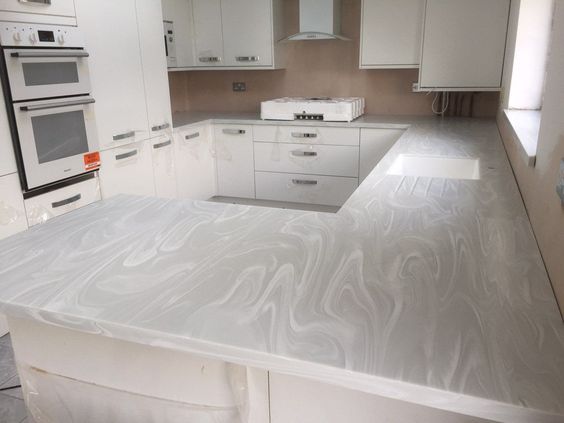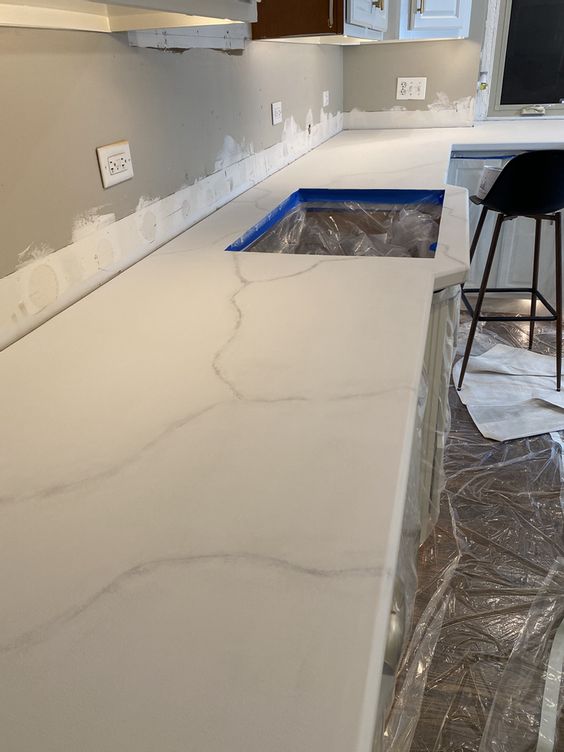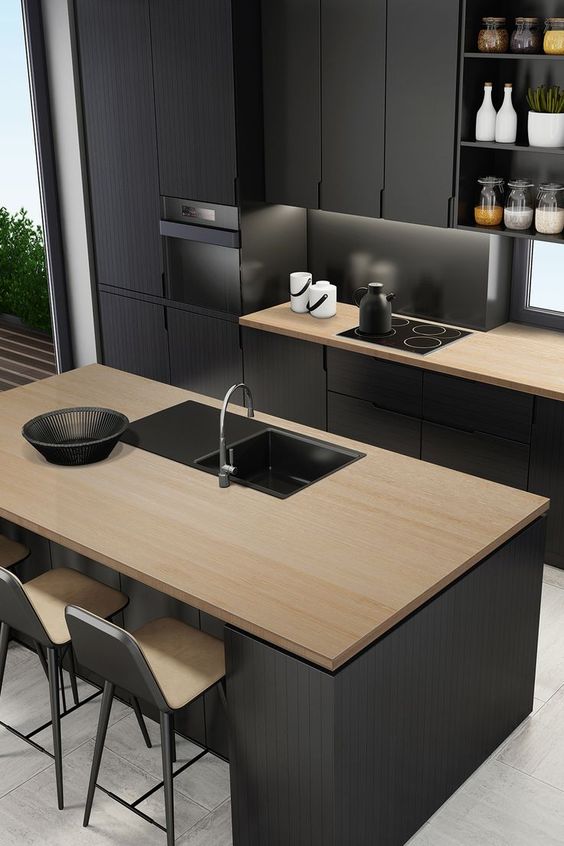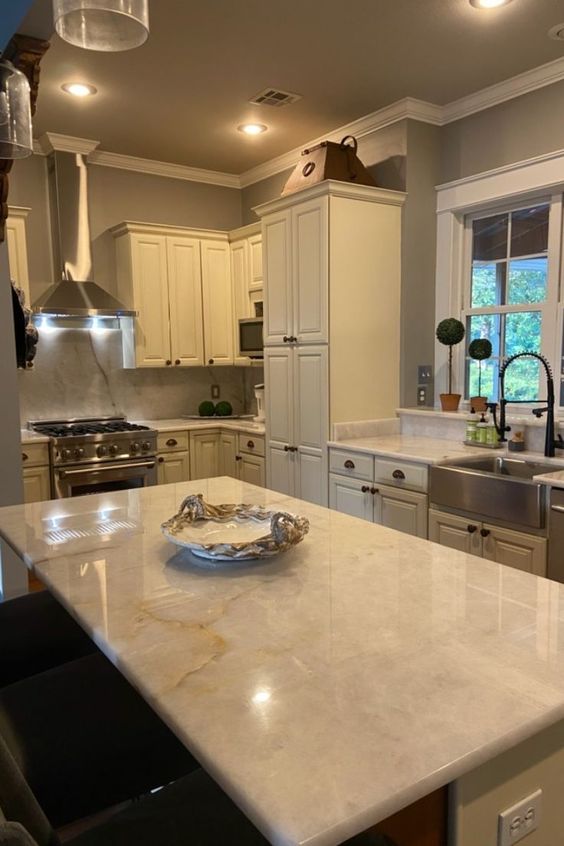Whether a small home or a big mansion, the kitchen is one of the most intrinsic and important parts of any home. And, if you want to spruce up the beauty and versatility of the kitchen space, choosing the best countertop material becomes essential. At a time, when there are lots of options available to pick from, sometimes it becomes difficult for individuals to make the right choice of kitchen countertops.

The reason behind this is the lack of knowledge about different stones and materials that are used to design kitchen countertops. So, here we are going to highlight all popular types of kitchen countertops that are being preferred by people these days.
1. Corian

Solid-surface countertop materials include Corian, which is a synthetic polymer. Sinks, shower walls, and backsplashes are some of its further uses. Corian is impervious and durable under heavy use. Despite its ability to endure heat up to 212 degrees Fahrenheit, Corian should not be exposed to hot surfaces for long periods of time. This material is resistant to water, does not support microbial growth, and is easy and quick to clean with common home cleansers.
Corian comes in a wide assortment of hues, sometimes in repeating patterns. Sinks and backsplashes may be included into the overall design to give the kitchen a unified appearance.
The surface is extremely stain resistant and will not be harmed by common household acids like vinegar or lemon juice. If Corian countertops are scratched, they may be professionally resurfaced, and regular household cleaners can remove even the worst stains completely.
2. Granite
The hardest natural stone comes in slab form, granite is carved to the exact dimension to accommodate any kitchen countertop specifications. Granite kitchen countertops come in several distinct hues and patterns and are heat- and scratch-resistant. The substance must be wrapped, though, because it is porous. This little preventive measure can help avert stains and preserve the stone’s shine.
The appearance of real stone varies from piece to piece, so no two countertop surfaces will be indistinguishable. Granite can feature swirls and veins or a constant pattern. Homeowners will be able to create the unique style and touch they choose because to the variety of colours and patterns available.
Durability: Granite’s exceptional durability is one of the explanations it is such a well-liked material. Granite is one of the most hands-on countertop options since hot objects may be laid directly on its surfaces. Although it is possible to cut straight on the granite, doing so is not advised since it would dull the knives’ blades. Professionals advise sticking granite countertops every six to twelve months.

3. Marble

A classic choice for kitchen countertops, marble may have a beautiful aesthetic. Warm and bursting with personality, this natural stone. Marble counters maintain their coolness even in the sweltering hot days, which may inspire you to switch on the oven in the midst of a heat wave. But maintaining a marble surface isn’t the simplest task. Because it is soft and porous, like granite, sealing is necessary to prevent stains. If citrus juices, wine, or milk are spilled on the stone, they should be cleaned up very once to prevent etching. Marble is delicate and prone to scratching and chipping, yet over time these flaws give it a lovely appearance.
Appearance: Marble slabs come in a variety of hues and are often veined irregularly. Traditional marble kitchen countertops are frequently white with faint grey veining, although brown, beige, and black choices are all becoming more common.
Durability: In regard to natural stone worktops, marble is considered one of the softer choices. As an outcome, constant use increases the likelihood that it may get damaged, dented, and soiled. You may buy marble with either a polished or honed finish. Because of its dull surface, honing marble can conceal certain etching and scratches. Compared to honed marble, polished marble is glossy and more stain-resistant.
4. Bamboo

This green countertop choice is popular among homeowners for their kitchens. It’s a natural material that grows quite quickly, making it one of the eco-friendly countertop choices. In terms of hardness, it is frequently compared to steel and is harder than wood. Bamboo worktops are integrally anti-bacterial, but to prevent stains and maintain their spotless appearance, they must be routinely sealed.
The slender bamboo grasses must be joined together to create a solid surface because of their appearance. They may be added together in a number of ways, creating different patterns that add attention to the countertop. Countertop surfaces come in strand-woven, end grain, vertical grain, and horizontal grain varieties. The pattern and grain give your home a contemporary , organic, and fresh feel.
Durability: Bamboo is tough and durable. Despite the fact that bamboo is tougher than the majority of woods, some people consider it to be high maintenance owing to the ongoing need for sealing. It is not heat resistant, and sharp items will scratch it. If it does sustain damage, it may be repaired and sanded.
5. Quartzite
Quartzite, which should not be confused with quartz, is a natural stone with marble-like swirling veins and a neutral tint. It is somewhat heat resistant, but like marble, it needs to be sealed frequently. Because of the quartz crystals in the stone, the majority of quartzite countertops have a glittering appearance when light reflects off of them.
Quartzite countertop materials typically have grey undertones and are white in colour. The stone is quite light, with a few rose or blueish undertones. Veining can be extremely light to highly noticeable. Despite being used as a countertop material very recently, quartzite is swiftly replacing marble in popularity.
Durability: Quartzite is more permeable than marble but is tougher and less chippable than marble. To preserve the stone’s inherent beauty, frequent sealing is crucial.

